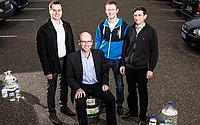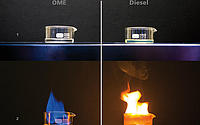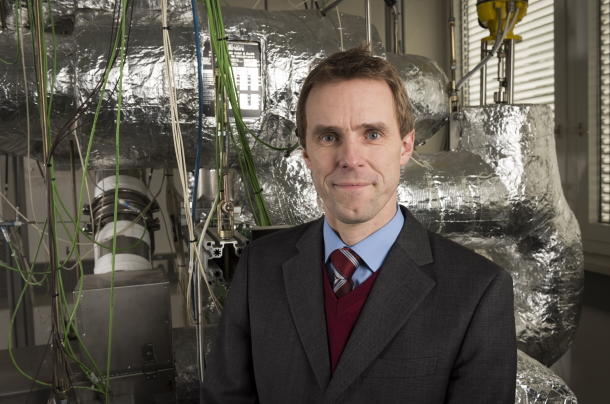How researchers from Karlsruhe, Munich and Kaiserslautern want to make road traffic cleaner with new diesel components.
Oxymethylene dimethyl ether – OME for short – sounds more bulky than diesel and super. Nevertheless, it is Prof. Joerg Sauer’s, Ph. D. Ulrich Arnold’s and their team’s desire, that it should flow out of gas pumps at gas stations someday. The researchers of KIT believe that these organic compounds could offer a cleaner future in many areas of mobility.
For years, the automotive industry is investing large sums in technologies that reduce soot emissions during diesel combustion. Increasingly stringent emissions standards require high-performance catalytic converters and soot filters, but most of these are complex and expensive. Some well-known alternative powertrains exist, such as electric or natural gas engines, but they also have drawbacks and are not gaining acceptance, for example in the commercial vehicle market. "It would be better to find a fuel that causes fewer pollutants and still works in the normal diesel engine," says chemist Ulrich Arnold. That would offer enormous advantages over, for example, the electric car, for which intensive research is needed into new battery systems.
For example, some manufacturers, including in Scandinavia and North America, are relying on vehicles powered by dimethyl ether and have achieved good results in extensive tests. "One disadvantage of these systems is that the fuel is a liquid gas. In the case of dimethyl ether, this is not different to the fossil liquefied petroleum gas. But for the use of dimethyl ether in motor vehicles, considerable modifications to the vehicle would be necessary," explains Arnold, who has been conducting research in the field of fuels at the KIT Institute for Catalysis Research and Technology for almost ten years.
It is well known that OMEs already prevent soot formation during the combustion process. Until now, they nevertheless did not seem interesting as a fuel additive because these organic compounds are hardly available, says Ulrich Arnold: "It is hardly possible to buy larger quantities because no advanced and economical process for producing OME exists on the market. The current synthesis routes require expensive starting materials and complex separation of the products from unwanted byproducts."
In 2011, this aroused the ambition of Arnold and fellow researchers from Munich and Kaiserslautern. They set themselves the goal of developing a technology that could produce OMEs on an industrial scale. "Unfortunately, we're not there yet. However, we are working on a new manufacturing process that is much cheaper and simpler on a small scale than previous methods. Now we're on the cusp of scaling up our new manufacturing process to produce larger quantities."
The production process now uses low-cost standard chemicals that can be produced in an environmentally friendly way from renewable raw materials, such as methanol and formaldehyde. The reaction products can then be separated directly with diesel fuel. The result is a simple mixture of OME and conventional diesel that can be used as fuel. With its high cetane number and the associated high ignition propensity, the new fuel is suitable for use in diesel engines. It is non-hazardous and liquid, so it could be refueled at common gas pumps.
At the moment, the fuel is being put through its paces using various test methods. Ulrich Arnold and his colleagues are now hoping that industry is willing to innovate: "To produce sufficient quantities of OME, larger production plants are needed. This cannot be achieved with research in universities and non-university institutes by itself. As chemists and process engineers, we have optimized the technology to such an extent that it is worth considering commercialization. To ensure that it doesn't disappear into a drawer now, science, politics and industry must work hand in hand."
"As a chemist, I can say: we can't get it any cleaner, simpler or cheaper. We hope that our OME process will catch on in the fuel market. If not, we at least want to convince niche markets."
SUSTAINABLE AND LOW-POLLUTING
The European Commission has set a target of reducing carbon dioxide emissions from the European economy by around 80 percent. This includes traffic on Europe's roads, where emissions are to be reduced by 60 percent. To achieve this goal, the Commission's strategy includes traffic reduction and modal shift, as well as the use of electric-powered vehicles and the development of new fuels. With its very low emissions, OME offers great potential as a forward-looking fuel.
Images: KIT




